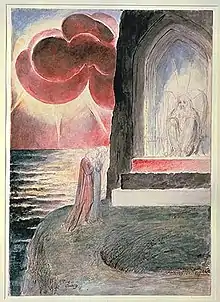Purgatory
According to the teaching of the Roman Catholic Church, Purgatory is the "final purification of the elect": "All who die in God's grace and friendship, but still imperfectly purified, are indeed assured of their eternal salvation; but after death they undergo purification, so as to achieve the holiness necessary to enter the joy of heaven."[1]
“In Purgatory there are different levels; the lowest is close to hell and the highest gradually draws near to Heaven. It is not All Souls Day, but, Christmas, that the greatest number of souls leave Purgatory.
There are in Purgatory, souls who pray ardently to God, but for whom no relative or friend prays on earth. God makes them benefit from the prayers of other people.
It happens that God permits them to manifest themselves in different way, close to their relatives on earth, in order to remind men of the existence of Purgatory and to solicit their prayers to come close to God who is just, but good.
Purgatory in art and culture

Perhaps the best-known instance of purgatory in the arts is Dante's Purgatorio, the second book of his Divine Comedy. Likewise, the Ghost in William Shakespeare's Hamlet may also presuppose a belief in purgatory,[2]
Related pages
Footnotes
- Catechism of the Catholic Church § 1030-1031 (section entitled, "The Final Purification, or Purgatory); cf. Council of Florence (1439): DS 1304; Council of Trent (1563): DS 1820; (1547): 1580; see also Benedict XII, Benedictus Deus (1336): DS 1000.
- "I am thy fathers spirit, Doomd for a certaine tearme to walke the night, And for the day confind to fast in fires, Till the foule crimes done in my dayes of nature Are burnt and purg'd away". Archived 2018-12-29 at the Wayback Machine
Sources
- Akin, James. How to explain Purgatory to Protestants
- Blackwell Dictionary of Eastern Christianity (Oxford: Blackwell, 1999)
- Catechism of the Catholic Church, available online Archived 2007-11-02 at the Wayback Machine
- Catechism of St. Philaret (Drozdov) of Moscow
- Catholic Encyclopedia of 1914, Purgatory
- Clendenin, Daniel B. (ed.). Eastern Orthodox Theology (Grand Rapids: Baker Books, 1995)
- Demetry, Constas H. Catechism of the Eastern Orthodox Church
- Dragani, Anthony. From East to West: Purgatory
- O' Collins, Gerald and Mario Farrugia. Catholicism: the story of Catholic Christianity (Oxford: Oxford University Press, 2003)
Other websites
- CatholicBridge.com, Purgatory Archived 2007-07-02 at the Wayback Machine — Ecumenical article by David MacDonald concerning Evangelical and Catholic belief
- Catholic Answers, Purgatory Archived 2007-06-10 at the Wayback Machine — Catholic apologetic article
- NewAdvent.org, Purgatory — 1913 Catholic Encyclopedia article
- philvaz.com/apologetics Archived 2014-07-13 at the Wayback Machine — Readings from the Church Fathers and other sources on Purgatory, by Phil Porvaznik
- EWTN.com library, Heaven, Hell and Purgatory according to Pope John Paul II Archived 2007-06-30 at the Wayback Machine — Article from the newspaper of the Holy See, L'Osservatore Romano, July-August 1999
- JewishEncyclopedia.com, Purgatory — Article by Kaufmann Kohler in the online Jewish Encyclopedia
- New Schaff-Herzog Encyclopedia of Religious Knowledge, Purgatory — Article by C. A. Beckwith in the 19th century Protestant encyclopedia (ed. Philip Schaff)
- Purgatory account in the 1911 Encyclopaedia Britannica.
- I Believe in Purgatory... — excerpt from C. S. Lewis's Letters To Malcolm: Chiefly on Prayer, chapter 20
- Frequently Asked Questions Archived 2007-04-16 at the Wayback Machine at Holy Souls Online
- Purgatory and praying for the dead on Catholic Apologetic
- "Prisoner of the King: Thoughts on the Catholic Doctrine of Purgatory", H. J. Coleridge, 1889. retrieved 24 May 2007